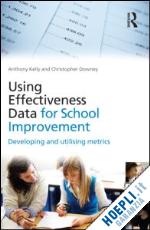Data metrics in schools are becoming increasingly complex, but despite their best efforts, teachers and academics generally find them something of a ‘black-box’. This book lifts the lid on that box, exploring the provenance and problematization of existing techniques and developing new algorithms for measuring the more oblique aspects of in-school performance. Using contextual value-added measures in England as a foundation - they have become the template of choice for policy-makers around the world and a basis for some excellent school effectiveness research - the book explores the potential of performance and progress data to guide student and teacher self-evaluation, to set targets and allocate resources, to evaluate initiatives and identify good practice, to assess and reward staff responsibility, and to inform policy in relation to emerging issues like school choice, equality of opportunity and post-compulsory progression. Chapters are sectioned in three parts - ‘Past’, ‘Present’ and ‘Future’ - and cover: the historical journey from raw-threshold to refined-contextual measures of school effectiveness research and policy on pupil attainment and value-added data the leading UK government and Fischer Family Trust models issues relating to differential effectiveness and the interpretation of data how best to blend data from different sources new non-cognitive metrics for assessing social and emotional aspects of learning (SEAL) and staff responsibility managing data for school improvement and understanding professional attitudes to it. Using Effectiveness Data for School Improvement brings together for the first time in one place the various metrics and models, and their basis in research. A full technical specification is included so that both ‘data experts’ and ‘data novices’, academics and practitioners, can use the book to understand and maximize what is potentially a hugely transforming, but under-utilized, resource and an increasingly important aspect to school and curriculum management.











